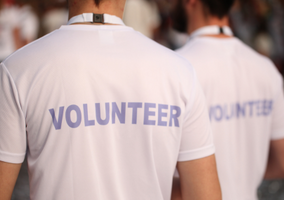The Royal Voluntary Service (RVS) has “brought forward” opt-outs of mandatory biometric ID checks on GoVo, its new national digital volunteering system, for some roles after criticism from within the charity sector.
GoVo, which had a high-profile launch in early October, has been billed as a bid to “supercharge” UK volunteering by making it more accessible to the public. Thousands of charities have signed up to the initiative.
Research carried out by RVS and partner organisations has found charities face a likely shortfall of three million volunteers, with around a sixth of respondents mentioning difficulties finding a role, or frustrations with application processes.
But some working in the charity sector have raised concerns that asking prospective volunteers to verify their identity digitally, as GoVo has done, risks putting off applicants from marginalised communities or who are less digitally adept.
‘The most convoluted way to volunteer’
In a post on LinkedIn earlier this month, Jennie Mann, founder of the Bloom Volunteering consultancy, which supports charities around volunteering and digital marketing, said mandatory biometric checks risked “eroding the spirit that underpins volunteering”.
“What bothers me most is that RVS is doing this massive campaign, which could be amazing, but they're sending people to their front door, to the most convoluted and difficult way to volunteer,” Mann told Civil Society. “They have to remove biometric testing as the first point of entry for all volunteers.”
In her post, she added: “Requiring government-grade documentation turns an open door into a guarded gate, undermining the ethos GoVo claims to champion: making volunteering easier and more inclusive.”
Others in the charity sector echoed the concerns.
“Making [ID checks] the basis for [every role] with a new mainstream volunteering website risks leaving lots of people out for whom volunteering can be really valuable, and entrenching ideas of what a volunteer looks like,” wrote Kim Hopkinson, head of development at GoodGym, in comments under Mann’s post. “At first glance this seems like a misstep.”
Kit Lendon, head of volunteering at Dogs Trust, wrote: “Asking for this level of information does certainly seem to be at odds with the frictionless flexible volunteer experience we’re all aiming for.”
Deborah Millican, volunteer head of income generation for Girlguiding North West England, told Civil Society: “In my experience, a lot of volunteers are elderly or economically inactive.
“They wouldn't necessarily have access to the technology required to register biometric data, may not have an up-to-date passport or driving licence, and probably are not happy providing all that data when they are only thinking about volunteering.”
Change to be implemented ‘in coming weeks’
In response to the concerns, Emma Gervasio, RVS’s chief operating officer, said GoVo’s development roadmap had included an opt-out “no ID check required” route for charities “to utilise for suitable roles”.
“We’ve now brought this change forward,” Gervasio added. “We are implementing the update in the coming weeks and have communicated with charities on GoVo that this change is on its way.”
Charities will be able to identify whether “lighter-touch” or microvolunteering roles require ID checks, according to an RVS spokesperson, with guidance about the non-ID check route and its process available for when changes are introduced.
However, they said it was “likely” the majority of roles on GoVo will still need an ID check – but that there would only be a single instance of this and that charity partners would be asked not to repeat the process.
The organisation has longer-term aspirations to develop a “volunteer passport” to enable people to move easily between roles and charities without having to repeat processes and checks on each occasion.
RVS’s spokesperson said this was not yet in development but will be developed alongside sector partners in due course.











